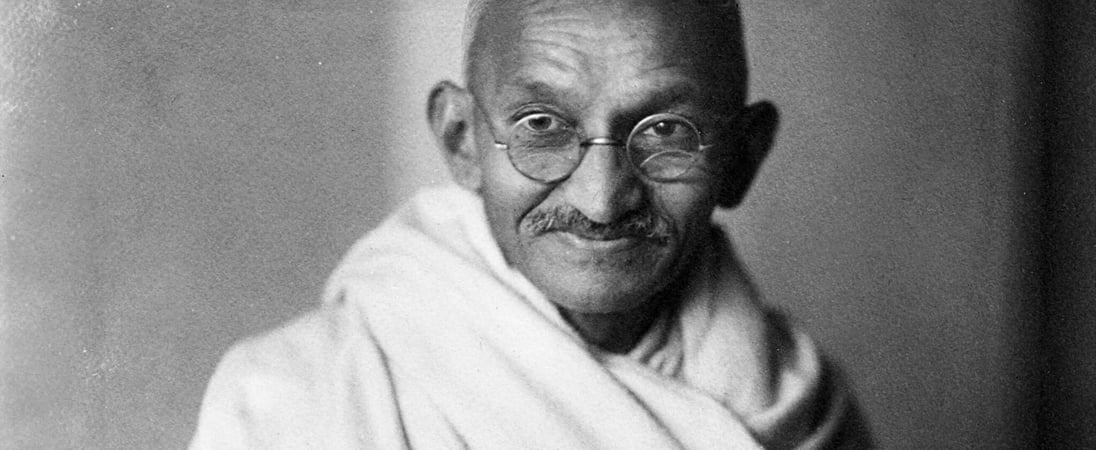
Mahatma Gandhi
Mahatma Gandhi, born on October 2, 1869, was a man who changed history. His journey from a young lawyer to the leader of India’s independence movement is a story of courage and determination.
Gandhi believed in fighting without violence, inspiring millions around the world. His approach, nonviolent resistance, became a powerful tool for change in India and globally.
His legacy includes leading India to freedom from British rule in 1947 through peaceful protests and civil disobedience.
October 2, celebrated as Gandhi Jayanti, marks Gandhi’s birth anniversary. This day is not just a national holiday in India; it’s a global reminder of the power of peaceful protest and the importance of living harmoniously.
People honor Gandhi’s memory by reflecting on his life, teachings, and the enduring values he championed, such as truth, nonviolence, and harmony among communities. The day encourages everyone to incorporate Gandhi’s principles into their lives, striving for a cleaner, more inclusive society.
The reasons for celebrating Gandhi Jayanti are profound and varied. It serves as a tribute to a man who led by example, showing that change is possible through peaceful means.
The day also prompts us to remember and strive towards Gandhi’s vision of Swaraj (self-rule) and Swadeshi (self-reliance), advocating for a society where everyone lives in peace and dignity.
By commemorating Gandhi Jayanti, we honor his contribution to India’s independence and pledge to continue his work towards a just and equitable world.
How to Celebrate Mahatma Gandhi
Celebrating Mahatma Gandhi comes with a swirl of simplicity and a sprinkle of profound thought. Here are some playful suggestions to honor the man who walked the talk of non-violence and truth.
Spin a Yarn, Literally
Why not dive into the craft of spinning on a charkha? Gandhi saw spinning as a way to promote self-reliance and a form of peaceful protest. Gather some cotton and a small spinning wheel. Who knows? You might just weave your thoughts into the fabric.
Art and Essay Extravaganza
Unleash your inner artist or writer by participating in art exhibitions and essay competitions themed around Gandhi’s life and teachings. Whether it’s painting a serene scene of the Salt March or penning thoughts on non-violence, let creativity flow in honor of Gandhi’s legacy.
Movie Marathon with a Twist
How about a Gandhi-themed movie night? From biopics to documentaries, there’s plenty to learn from and be inspired by. But here’s the twist: make it a silent film night. After all, what better way to appreciate the power of nonviolence than by soaking in stories in serene silence?
A Day of Non-Violence
Embrace Gandhi’s philosophy by dedicating the day to non-violence in thoughts, words, and actions. It could be as simple as practicing kindness for a day.
You could smile at that pesky neighbor or cook a meal for someone. It’s all about living the Gandhian way, even if just for a day.
So, there you have it—four quirky suggestions to celebrate Mahatma Gandhi. Whether it’s through the gentle hum of a spinning wheel, the stroke of a brush, the silence of a movie, or a kind gesture, each act brings us closer to understanding the essence of Gandhi’s message. Happy celebrating!
History of Mahatma Gandhi
Mahatma Gandhi’s life was a journey of courage and non-violence. Born in Porbandar, India, in 1869, he went on to become a leader who would inspire millions around the globe.
After studying law in London, Gandhi spent 21 years in South Africa, where he developed his philosophy of non-violent resistance known as Satyagraha. This approach was first used to fight racial discrimination there.
Returning to India in 1915, Gandhi joined the Indian National Congress and became a central figure in India’s struggle for independence from British rule.
He led several key movements that emphasized non-violence and civil disobedience. The Champaran and Kheda agitations were among his early successes, helping farmers protest against unjust policies and taxes imposed by the British.
Gandhi’s call for a Non-cooperation Movement after the Jallianwala Bagh Massacre in 1919 marked a significant step towards full independence, urging Indians to withdraw support from British institutions.
The Salt March of 1930 was another landmark event led by Gandhi to protest against the salt tax imposed by the British.
This 240-mile march to the sea symbolized the defiance of British laws and ignited a series of acts of civil disobedience across India.
Gandhi’s methods and his commitment to non-violence and Swadeshi (self-reliance) principles profoundly impacted India’s independence movement and future generations and leaders worldwide, including Martin Luther King Jr. and Nelson Mandela.
Gandhi’s life and work remain a beacon of hope and peace. They teach us the power of nonviolence and the importance of standing up for justice and truth.
His legacy continues to inspire global movements for civil rights and freedom, emphasizing the impact one individual can have on the world.
Mahatma Gandhi FAQs
What was Gandhi’s favorite hymn, and why is it important?
One of Gandhi’s favorite hymns was Vaishnav Jan To, a 15th-century Gujarati devotional song by poet Narsinh Mehta. It emphasizes selflessness, compassion, and humility—qualities Gandhi admired.
The song was frequently sung at his prayer meetings. Today, it is performed globally on Gandhi Jayanti, often in diverse languages, showcasing its universal appeal.
In 2018, artists from over 40 countries recorded versions of it as a tribute to Gandhi’s message of peace.
What is the connection between Gandhi and the Nobel Peace Prize?
Despite his immense influence on non-violent resistance, Gandhi never received a Nobel Peace Prize.
He was nominated five times (1937, 1938, 1939, 1947, and posthumously in 1948). The Nobel Committee later acknowledged this omission as a significant oversight.
The 1948 award was withheld because no “suitable living candidate” was found, following Gandhi’s assassination.
How did Gandhi influence the Indian flag?
Gandhi promoted the idea of a national flag long before independence. He advocated for the inclusion of the spinning wheel (charkha) on a flag as a symbol of self-sufficiency and unity.
The 1931 Indian National Congress adopted a version of his proposed flag, which inspired the current tricolor design.
Though the modern flag replaced the charkha with the Ashoka Chakra, its message of progress and self-reliance remains rooted in Gandhian philosophy.
What was Gandhi’s connection to chess?
Though Gandhi opposed violence in all forms, he appreciated chess. He believed the game taught patience, strategy, and non-violent conflict resolution.
Interestingly, chess has origins in ancient India, and Gandhi’s homeland of Gujarat played a key role in its history.
Some historians suggest that Gandhi, as a strategic thinker, may have drawn parallels between the game and his non-violent resistance tactics.
How do schoolchildren celebrate Gandhi Jayanti in India?
Schools across India hold essay-writing competitions, skits, and painting contests on Gandhi’s life.
A unique tradition involves students cleaning their classrooms and surroundings, reinforcing Gandhi’s emphasis on cleanliness.
Some schools even organize “silent walks,” where children march in peaceful silence to honor Gandhi’s non-violent protests.
What is Gandhi’s connection to the Salt March’s global influence?
The Salt March (Dandi March) of 1930 was one of Gandhi’s most famous acts of civil disobedience.
His defiance of British salt taxes inspired similar movements worldwide. In the U.S., Martin Luther King Jr. referenced Gandhi’s march during the Montgomery Bus Boycott.
In South Africa, the anti-apartheid movement drew strategies from it. Even modern climate activists cite it as an example of effective peaceful protest.
Why do people in Japan celebrate Gandhi’s legacy?
Japan deeply respects Gandhi’s philosophy. Schools and cultural institutions commemorate him with peace lectures and meditation sessions.
In Hiroshima, where non-violence has special significance, Gandhi’s teachings are linked to nuclear disarmament efforts.
The city’s Peace Park has events on Gandhi Jayanti, drawing parallels between his anti-violence philosophy and Japan’s pacifist stance after World War II.
Did Gandhi have a sense of humor?
Despite his serious mission, Gandhi had a sharp sense of humor. He once quipped, “I would have been a lawyer, but then I found it easier to be a rebel.”
He also joked about his own fame, saying, “You may never know what results come of your actions.
But if you do nothing, there will be no result.” His wit softened tense situations, making his activism more approachable.
What is the connection between Gandhi and Apple Inc.?
Gandhi was one of the historical figures featured in Apple’s iconic “Think Different” campaign in the late 1990s.
The ad honored visionaries who changed the world, placing Gandhi alongside Einstein, Martin Luther King Jr., and others.
The campaign helped establish Apple’s brand philosophy of challenging norms and thinking innovatively.
What is the most unusual gift ever given to Gandhi?
In 1947, British journalist Louis Fischer gifted Gandhi a spinning wheel small enough to fit inside a briefcase.
It symbolized self-reliance and Gandhi’s Swadeshi movement. The compact charkha became one of his most treasured possessions. Today, it is displayed at the Sabarmati Ashram Museum in Ahmedabad.
Also on ...
View all holidaysNational Name Your Car Day
You can’t truly love your car until you give it a name. Consider your car’s quirks and personality and come up with a fitting name, or try a Car Name Generator.
National Poetry Day
Stringing words like pearls, creating a dance of emotions and thoughts on paper, poetry weaves magic that speaks to the heart.
World Farm Animals Day
Created in memory of Gandhi, who advocated respecting all animals, National Farm Animal Day is about the crucial and often mistreated farm creatures.
We think you may also like...
St. George’s Day
Legend has it that St. George slayed a dragon. Today, his bravery is celebrated worldwide, inspiring us to be courageous.
St. Andrew’s Day
Celebrated for his kindness and valor, the patron saint of Scotland's legacy lives on through the Scottish flag and the country's traditions.








